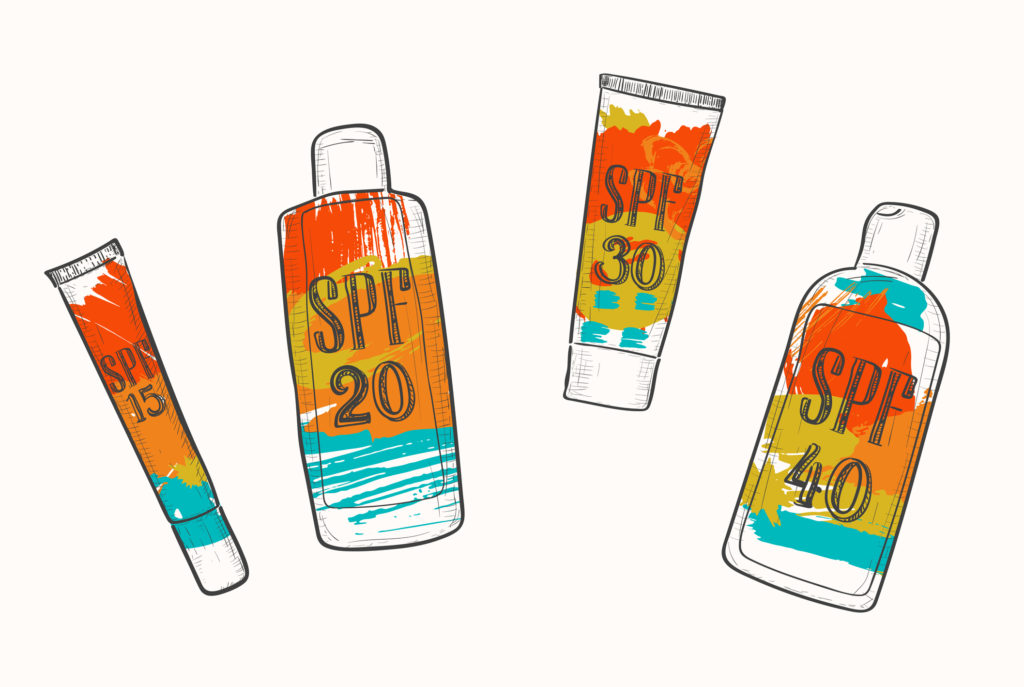Q. Does a sunscreen with a high SPF (sun protection factor) protect skin better than one with a lower SPF? How high should I go?
A. I wish I had a short, simple answer to this question, but it is a little complicated. As a dermatologist and photobiologist, I have studied the damaging effects of the sun’s ultraviolet (UV) radiation on skin, as well as how to protect against them. So I can walk you through a few important points that will make you more of a sun protection expert, too!
Ultraviolet light is invisible to humans, because it has shorter wavelengths than the light we can see. Within the UV spectrum, there are two types of rays that can damage the DNA in your skin cells and lead to skin cancer. It’s important to protect your skin from both types:
- UVB rays cause sunburn and play a key role in developing skin cancer. A sunscreen’s SPF number refers mainly to the amount of UVB protection it provides.
- UVA rays cause skin damage that leads to tanning as well as skin aging and wrinkles. The shortest wavelengths of UVA rays also contribute to sunburn. It’s important to look for the words “broad spectrum” on a product’s label, which means it has ingredients that can protect you from UVA as well as UVB rays.
What Does the SPF Number Mean?
The SPF number tells you how long the sun’s UV radiation would take to redden your skin when using the product exactly as directed versus the amount of time without any sunscreen. So ideally, with SPF 30 it would take you 30 times longer to burn than if you weren’t wearing sunscreen.
An SPF 30 allows about 3 percent of UVB rays to hit your skin. An SPF of 50 allows about 2 percent of those rays through. That may seem like a small difference until you realize that the SPF 30 is allowing 50 percent more UV radiation onto your skin.
Under ideal conditions (like in a laboratory), a sunscreen with higher SPF protection and broad-spectrum coverage offers more protection against sunburn, UVA damage and DNA damage than comparable products with lower SPF values.
But, real life is not like a lab. In real life, products with very high SPFs often create a false sense of security. People who use them tend to stay out in the sun much longer. They may skip reapplying. And they may think they don’t need to seek shade, wear a hat or cover up with clothing. They end up getting a lot more UV damage, which, of course, defeats the purpose.
For people who have a history or high risk of skin cancer, genetic diseases such as albinism or xeroderma pigmentosum or certain immune disorders, SPF 50 may not be enough. Same goes for certain scenarios, such as hiking or skiing at high altitude or vacationing near the equator.
The Skin Cancer Foundation recommends a water-resistant, broad-spectrum sunscreen with an SPF of 50 or higher for any extended outdoor activity. Regardless of the SPF, though, it’s important to apply one ounce (two tablespoons) 30 minutes before going outside and reapply it every two hours or immediately after swimming or sweating.
Beyond Sunscreen
Sometimes when you ask a question, you realize it’s the wrong question. Maybe the better question would be, “What is the best overall strategy to protect my skin?”
Here’s the answer: It’s important not to rely on high-SPF sunscreens alone. No single method of sun defense can protect you perfectly. Sunscreen is just one vital part of a strategy that should also include seeking shade and covering up with clothing, including wide-brimmed hats and UV-blocking sunglasses.
About the expert:
 Steven Q. Wang, MD, a board–certified dermatologist and fellowship–trained Mohs surgeon, is the medical director of dermatologic oncology and dermatologic surgery at the Hoag Family Cancer Institute in Irvine, California. One of the country’s leading authorities on skin cancer detection, treatment and prevention, Dr. Wang is chair of The Skin Cancer Foundation Photobiology Committee.
Steven Q. Wang, MD, a board–certified dermatologist and fellowship–trained Mohs surgeon, is the medical director of dermatologic oncology and dermatologic surgery at the Hoag Family Cancer Institute in Irvine, California. One of the country’s leading authorities on skin cancer detection, treatment and prevention, Dr. Wang is chair of The Skin Cancer Foundation Photobiology Committee.





